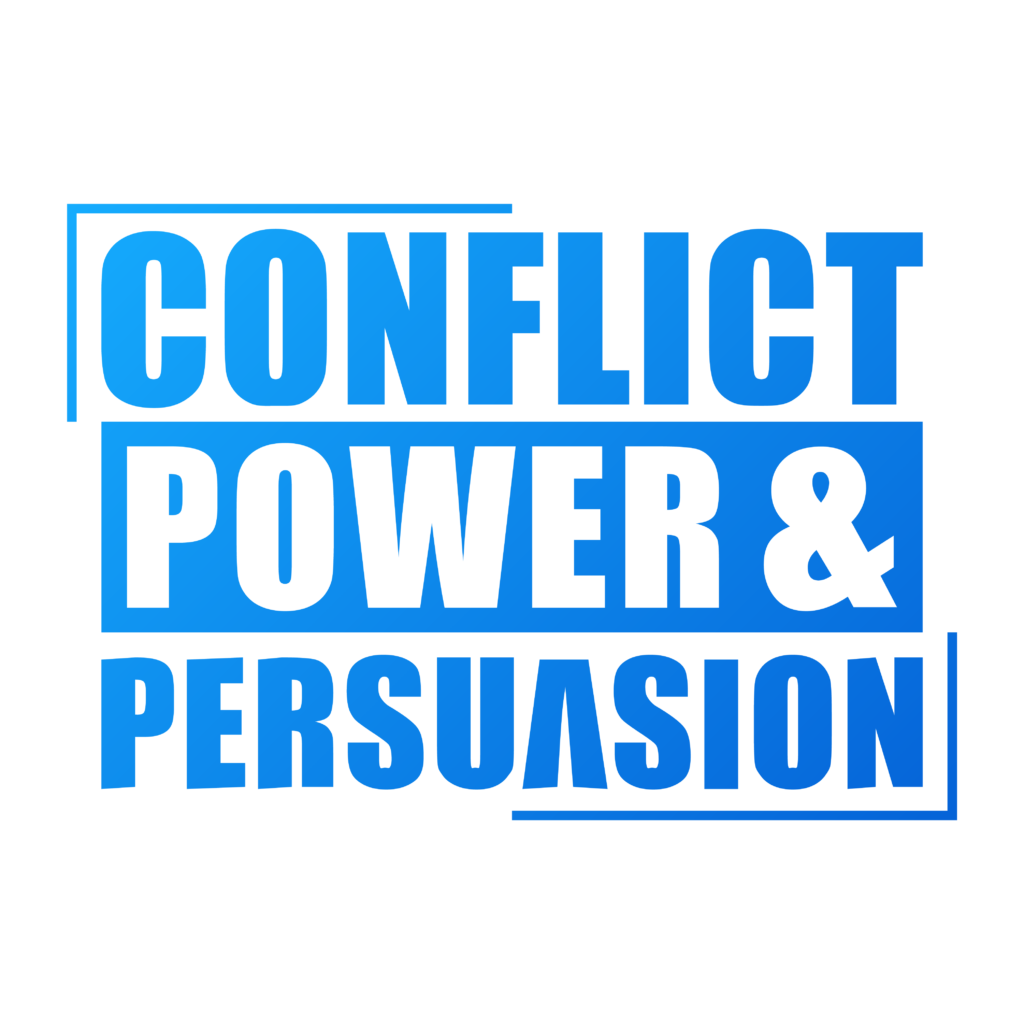
Hear from some of the most informative and experienced practitioners and thought leaders in the world to unpack the dynamics and transformative potential of Conflict, Power, and Persuasion. Stories to inspire, to inform, and equip you with the mindset and tools to apply in your pursuit of personal and professional excellence.

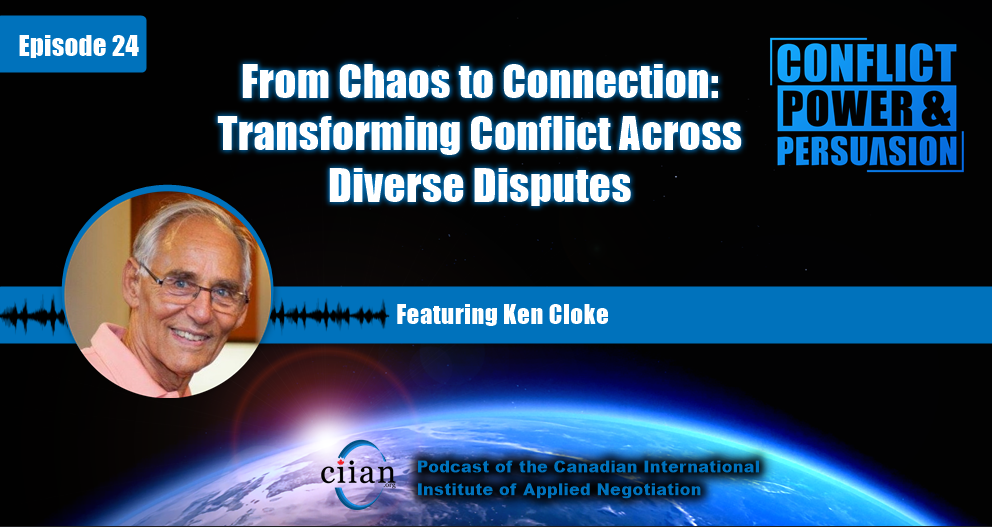
Ken Cloke is a globally recognized mediator, dialogue facilitator, and conflict resolution systems designer with over 40 years of experience. As Director of the Center for Dispute Resolution, he specializes in resolving complex disputes across sectors, including workplace, public policy, and cross-cultural dialogues. A co-founder of Mediators Beyond Borders, Ken has worked in over 25 countries and is the author of several influential books, including Mediating Dangerously, The Dance of Opposites, and his most recent work, The Magic in Mediation. He serves as an adjunct professor at institutions such as Pepperdine and USC, holds a Ph.D. from UCLA, and is a pioneer in designing preventative conflict resolution systems. A sought-after speaker and thought leader, Ken has dedicated his career to advancing innovative, inclusive approaches to conflict resolution worldwide.
Some Topics Discussed Include:
- Murray Bowen’s Family Systems Theory: the tension between individualization and integration in resolving conflicts.
- The power of ubuntu
- Three types of questions to navigate disputes: which to embrace, which to avoid, and why they matter.
- Chaos, complexity, and phase shifts: why abandoning old notions of the world is key to resolving disputes.
- Transformation vs. transcendence: understanding the differences and how to achieve them.
- The single best question to ask when someone is angry.
- Three interest-based approaches to redefine democracy and politics.
- Mediating grief, loss, and dying
- What is an enemy?
- And much more!
Links:

Katrina Abatis is a Senior Program Officer in the Mediation Support Team at the Center for Security Studies (CSS), a think tank at ETH Zürich. She is the author of the paper featured in this episode, “Inviting the Elephant into the Room: Culturally Oriented Mediation and Peace Practice,” written as part of the Culture and Religion in Mediation (CARIM) program, a joint project between the CSS and the Swiss Federal Department of Foreign Affairs (FDFA).
Zaza Johnson Elsheikh is a commercial, family, and workplace mediator with almost 20 years of experience mediating shareholder disputes in family businesses and inheritance disputes, as well as reconciling complex families. Zaza’s mediation work draws on her experience as a Medical Doctor (1994–2002) and a Clinical Negligence Solicitor (2002–2006) before she became a member of the Centre for Effective Dispute Resolution (CEDR) faculty. Zaza teaches conflict resolution skills to both mainstream and neurodiverse adults and children in schools and top universities in the UK. As President of Belief in Mediation and Arbitration (BIMA), Zaza leads bimonthly Scripture-based Dialogue sessions, such as “Scriptural Guidance on Responding to Toxic Conflicts.” She is also recognized as a Muslim faith leader and has a particular interest in working with vulnerable people of all ages who are susceptible to radicalization and extremism.
In this episode of Conflict, Power, and Persuasion, Katrina and Zaza describe the concept of culturally oriented mediation. This approach became apparent to Katrina through Zaza’s sometimes unconventional mediation practices, which she found necessary to effectively address complex cultural disputes in her community and beyond.
Some topics discussed include:
- Distinguishing between culturally sensitive and culturally oriented mediation approaches
- Understanding the manifestations of “shame-triggered violence” in conflicts
- Employing “active impartiality” and “hardcore persuasion” to engage conflicting parties
- Exploring gender differences in promoting peace and resolving conflict
- Unconventional approaches for creating proactive entry points for peace
- Addressing how cultural differences can lead to mismatched expectations and conflicts
- The urgent need for addressing sexual violence against refugees
- The evolving role of culturally oriented mediation in an increasingly polarized world
- And much more!
Links:
- Culturally Oriented Mediation: Inviting the Elephant into the Room (the paper)
- Culturally Oriented Mediation: Inviting the Elephant into the Room (the blog)
- Belief in Mediation and Arbitration (BIMA)
- Collection of Zaza’s YouTube clips discussing culture in mediation
- Deeyah Khan’s documentary film: White Right- Meeting the Enemy
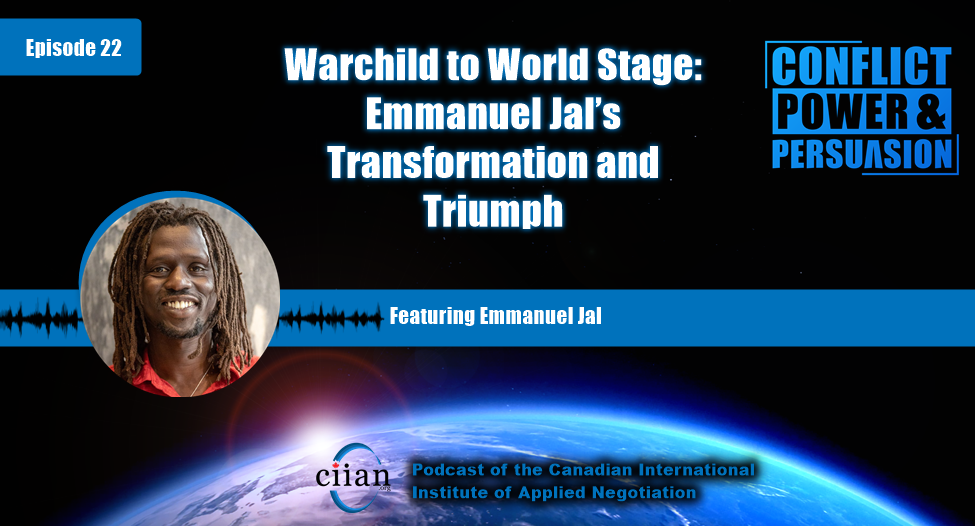
With seven award-nominated albums to his name, Emmanuel has collaborated and performed alongside musical legends like Lauryn Hill, Peter Gabriel, Ed Sheeran, Joss Stone, and Alicia Keys, marking his presence at global events including Nelson Mandela’s 90th Birthday Concert, Live 8, and the One Concert for the Dalai Lama.
His journey from child soldier to the world stage is captured in his autobiography and the award-winning documentary “Warchild.” Emmanuel’s acting talents were also showcased alongside Reese Witherspoon in “The Good Lie”.
As a dedicated peace ambassador, Emmanuel founded Gua Africa (GWA), providing educational support to those affected by war in East Africa, and spearheaded the ‘We Want Peace’ campaign, securing backing from global figures like George Clooney, Kofi Annan, and Richard Branson. His relentless pursuit of peace has been recognized with numerous awards, including the Vaclav Havel International Prize for Creative Dissent and the Desmond Tutu Reconciliation Award.
In this episode of Conflict, Power, and Persuasion, Emmanuel shares lessons and philosophies from his experiences as a refugee and child soldier, as detailed in his new book: My Life is Art. He discusses how life, much like a canvas, is shaped by our actions and experiences, offering his principles for overcoming adversity.
Links:
In this podcast, we feature tracks from Emmanuel Jal including ‘Warchild’ and ‘Baaki Wara’ from his album ‘Warchild.’ You can listen to the entire album on Spotify here: Warchild Album on Spotify.
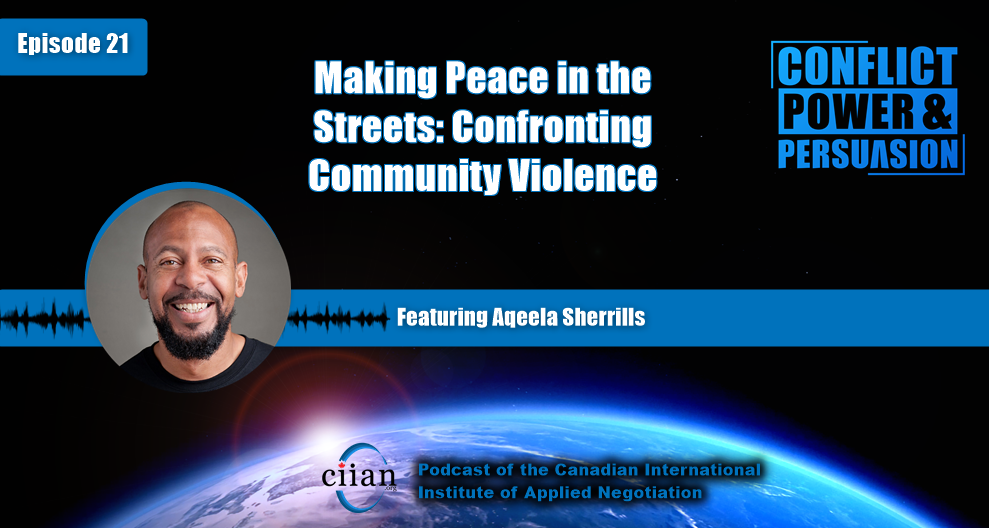
Aqeela is a seasoned activist with over three decades of dedication to community safety and healing from violence in underserved areas.
In 1992, he notably brokered a historic peace agreement between the rival gangs, the Bloods and the Crips. He’s a nationally acknowledged expert in victim services and community-driven public safety. Aqeela co-founded the Community-Based Public Safety Collective and spearheaded the Newark Community Street Team initiative. Under his leadership, Newark saw a significant drop in its homicide rate from 2015 to 2019.
Beyond his on-ground efforts, Aqeela has advised The International Association of Chiefs of Police and is renowned for his expertise in gang violence intervention, restorative justice, and trauma healing. He’s also a skilled facilitator, life coach, and mediator.
In this episode of Conflict, Power, and Persuasion, Aqeela takes us on a journey into the heart of community violence. You can feel his passion as he recounts growing up amidst the turbulent backdrop of the 1980s, in south Los Angeles, the profound impact it had on him, and his relentless drive to intervene and prevent further community violence.
Aqeela has been a trailblazer in this arena for decades, and he shares invaluable insights on effective strategies and the necessary shifts needed to reshape the narrative surrounding street violence.
Links:
Newark Community Street Team
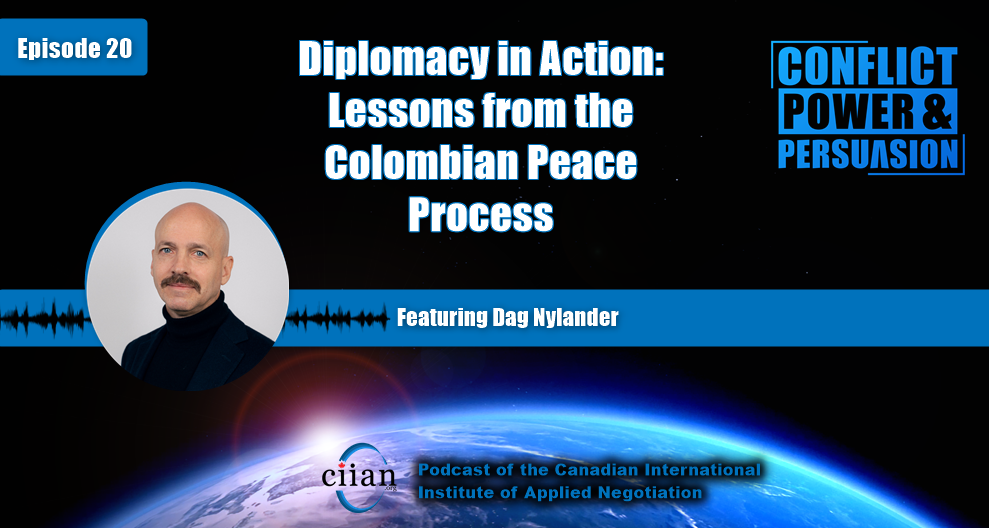
Dag Nylander is a Norwegian diplomat, and is currently the director the Norwegian Centre for Conflict Resolution (NOREF). Prior to joining NOREF, he was director and head of the Section for Peace and Reconciliation in the Norwegian Ministry of Foreign Affairs. Throughout his career, he has held several diplomatic positions, most notably as a mediator and Norwegian special envoy to Colombia. From 2010 to 2016 he led the Norwegian facilitation of the peace process between the Colombian government and the FARC. This work built on the foundations laid from 2006 to 2008, when he headed the Norwegian embassy in Bogotá. In 2017 he was appointed the United Nations Secretary-General’s personal representative on the border controversy between Venezuela and Guyana. Dag is a jurist by education and has practiced both as a lawyer and an assistant judge.
Some topics discussed include:
- Dag’s insights on the most crucial actions a mediator can take to ensure a successful outcome.
- Crafting a secure environment for participants, considering political, legal, and physical aspects.
- Cultivating trust between the parties and the mediator, and the pivotal role this plays in the mediation’s success.
- Navigating the ethical complexities of stakeholder inclusivity while keeping the process efficient.
- The transformative impact of placing victims at the heart of peace talks.
- The necessity of addressing victim justice for enduring peace.
- An exploration of Track Two diplomacy, its effectiveness, and best practices within peace processes.
- And much more
Links:
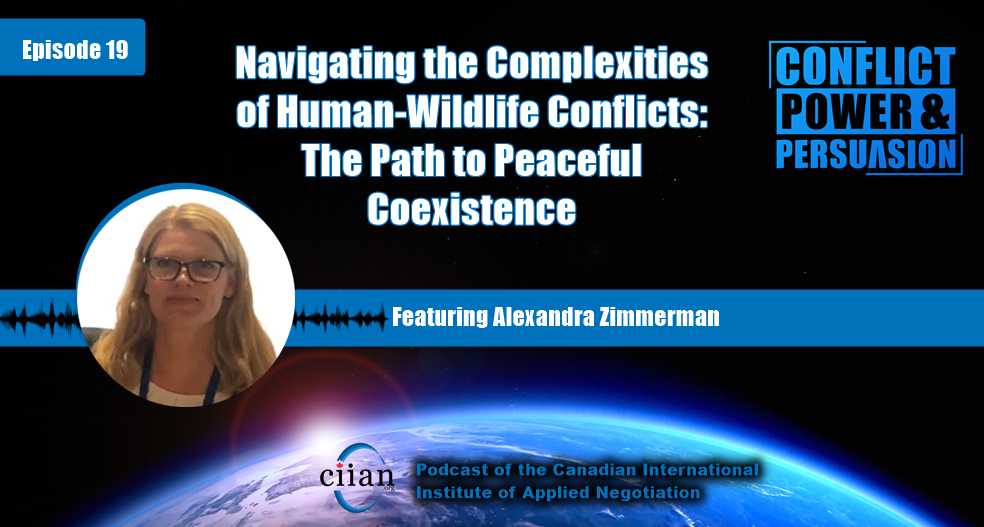
Alexandra Zimmerman founded and chairs the International Union for Conservation of Nature (IUCN), Human-Wildlife Conflict Task Force. She’s also a member of several IUCN groups, including the Asian Elephant Specialist Group, the Cat Specialist Group, SOS Technical Advisory Board, and the Conservation Advisory Board of Elephant Family. In addition, Alexandra serves as a Senior Advisor on Human-Wildlife Conflict to the World Bank and is a Senior Research Fellow at Oxford University’s Wildlife Conservation Research Unit (WildCRU).
Some topics discussed include:
- How human-wildlife conflicts can escalate and when reconciliation becomes essential.
- The limitations of “cut and paste” solutions, even for identical species in similar regions.
- Five guiding principles for addressing Human-Wildlife conflict.
- The collaborative nature of addressing Human-Wildlife issues across sectors and disciplines.
- The role of Human-Wildlife conflict in peace processes and the unique opportunities it offers.
- The readiness of the Human-Wildlife Conflict field to tackle the impacts of climate change.
- The goal of “co-existence” between humans and wildlife, and what it looks like.
- The importance of bridging the fields of conservation and conflict resolution.
- And much more!
Links:
IUCN SSC Human-Wildlife Conflict & Coexistence Specialist Group
IUCN Human Wildlife Conflict and Coexistence Library
IUCN SSC Guidelines on Human-Wildlife Conflict and Coexistence
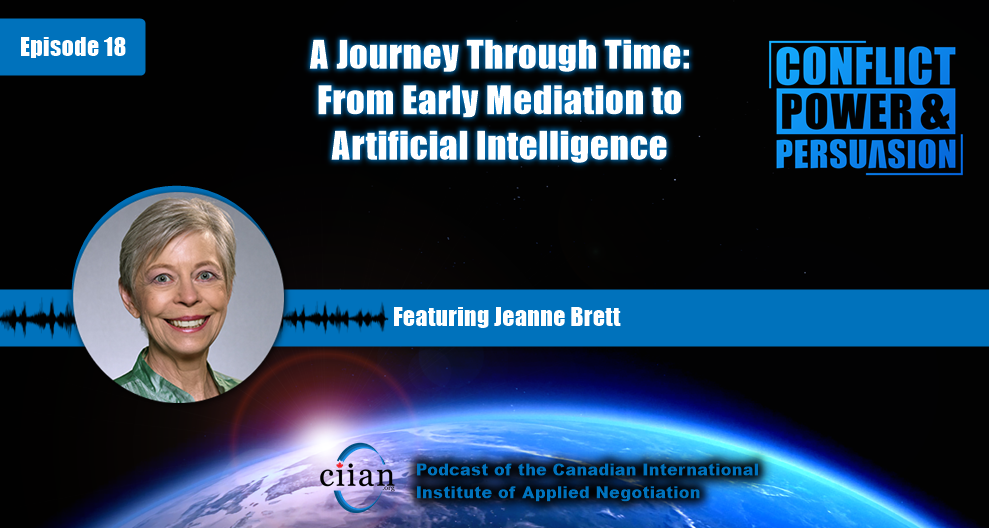
Jeanne is a highly distinguished and accomplished scholar in the field of dispute resolution. She is the DeWitt W. Buchanan, Jr. Distinguished Professor Emerita of Dispute Resolution and Organizations and the former director of the Kellogg School’s Dispute Resolution Research Center. Jean’s research has focused on cross-cultural negotiations, the resolution of disputes, and the performance of multicultural teams. Her current work explores culture and negotiation strategies, as well as the interface between AI and negotiations. She is a prolific author of books, journal articles, and negotiation teaching materials, including the award-winning books Getting Disputes Resolved with William Ury and Stephen Goldberg and the single-authored Negotiating Globally. She has initiated and taught Kellogg’s MBA courses in negotiations since 1981 and in cross-cultural negotiations since 1994. Her most recent book is Searching for Trust in the Global Economy with Tyree Mitchell.
On this episode of Conflict Power and Persuasion, Jeanne shares insights from her pioneering research, which have led to seminal ideas such as Interests, Rights and Power, and Dispute Resolution systems design. She also discusses her current research on negotiation and Artificial Intelligence, as well as exploring the crucial role of trust in negotiations across different cultures.
Links:
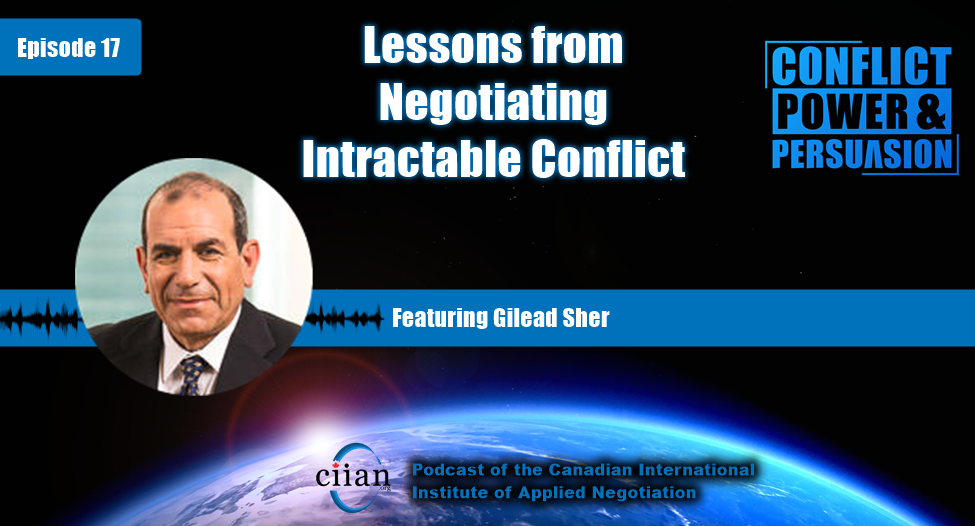
Gilead Sher is an Israeli attorney who specializes in international negotiations, both business and political. He served as Chief of Staff and Policy Coordinator to Israel’s former Prime Minister and Minister of Defense, Ehud Barak. In that capacity, he acted as one of Israel’s senior peace negotiators at the Camp David summit in 2000 and the Taba talks in 2001, as well as in extensive rounds of covert negotiations with the Palestinians.
Gilead has lectured on negotiation, mediation, and dispute resolution at several institutions including the Wharton School of the University of Pennsylvania, Tel Aviv University, and Harvard’s Program on Negotiation, and he is currently a fellow at Rice University’s, Baker Institute for Public Policy.
Gilead is a reserve colonel in the Israel Defense Forces and author of several articles and books including his latest, “Reflections on Conflict Resolution: In the Middle East and Beyond” published by World Scientific Publishing.
Some topics discussed include:
· The current status of the Israel-Palestine conflict
· Constructive Unilateralism: how to make peace without a negotiation partner
· Social media as a tool for peacebuilding
· How Iran went from a weak hand to striking a good deal at the 2015 nuclear negotiations
· Jimmy Carter’s drafting of a single negotiated text at the 1978 Camp David negotiations between Israel and Egypt
· The use of hardball tactics in negotiations
· Negotiation process design
· Impasses and why Bill Clinton “lost his cool” during Camp David negotiations
And much more…
Links:
Reflections of Conflict Resolution: In the Middle East and Beyond, by Gilead Sher – https://a.co/d/bNs65Wo
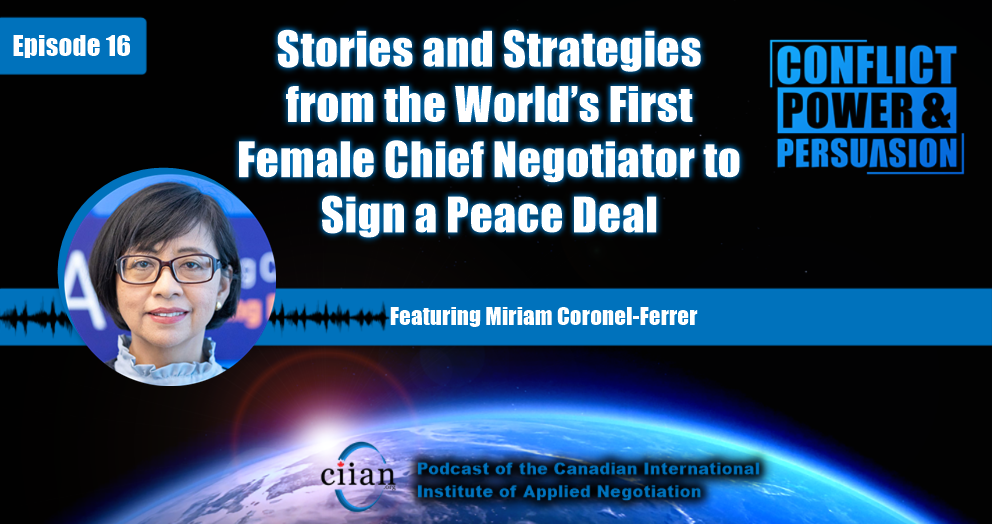
Miriam Coronel-Ferrer is a professor of political science at the University of Philippines Diliman and headed the Government of Philippines panel in peace talks with the Moro Islamic Liberation Front with culminated in the signing of a peace accord in 2014. Miriam is the first female chief negotiator in the world to sign a final peace accord with a rebel group. She was a member of the United Nations Standby Team of Senior Mediators during which she provided mediation support to UN missions in Afghanistan, Iraq, Maldives, Kosovo, Georgia, and Southeast Asia, among others. Miriam is also the recipient of numerous awards including the 2015 Hillary Rodham Clinton Award for Advancing Women in Peace and Security.
In this episode of Conflict, Power, and Persuasion, Miriam takes us behind the scenes of the negotiation process between the Government of the Philippines and the Moro Islamic Liberation front.
Topics covered include:
- The negotiation planning process.
- Building trust between negotiation parties.
- How the international community can assist with power imbalances between negotiation parties
- The importance of being culturally sensitive.
- The use of multiple tables and breaks during the negotiation process.
- The role of a facilitator as opposed to a mediator in negotiations.
- The strategies and dynamics of a well-functioning negotiation team.
- Considerations for religious beliefs in negotiations.
- A crash course on discourse analysis.
- The importance of inclusivity in the negotiation process.
And much more!
Links:
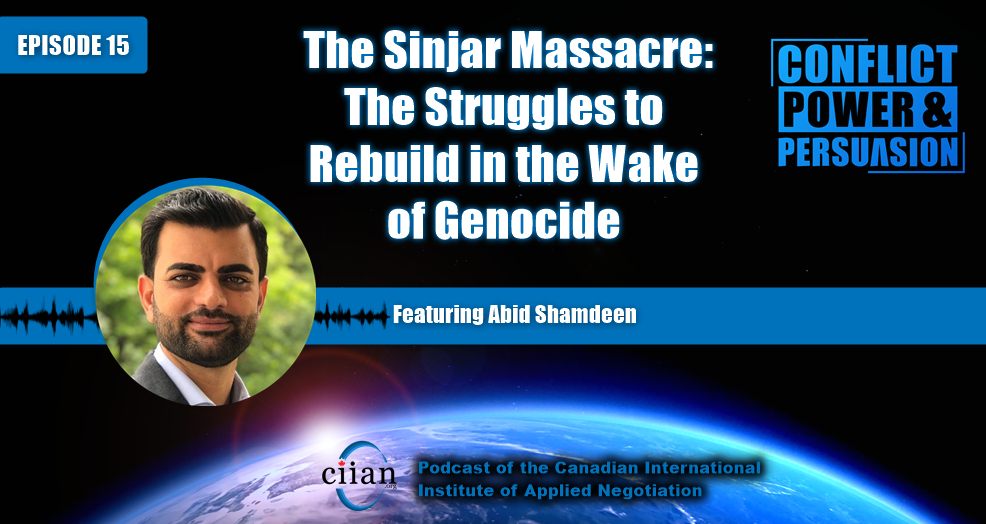
Abid Shamdeen was born and raised in Sinjar, Iraq. For the past six years, he has advocated for victims of the Yazidi genocide and has managed projects that have brought aid and assistance to internally displaced Yazidis in Iraq. During the United States-led invasion of Iraq, he worked for the US Army as a cultural advisor and translator. Abid holds a master’s degree in Political Science from the School of International Service at American University. Together with Nobel Peace Prize recipient, Nadia Murad, Abid co-founded Nadia’s Initiative whose mission is to “create a world where women are able to live peacefully and communities that have experienced trauma and suffering are supported and redeveloped”.
In this episode of Conflict, Power, and Persuasion, Abid describes the genocide of the Yazidi people by ISIS in the Sinjar Region of Iraq which took the lives of over 5000 people, with thousands more missing, many of which are presumed to be still in captivity. He not only speaks specifically of the plight of the Yazidi, including their history, the process which made the Yazidi vulnerable to an attack by ISIS, as well as detailing the aftermath of the Sinjar massacre, but in doing so he also provides invaluable insights into the risks of interventionism in politically disputed regions, as well as important considerations required to successfully rebuild and reintegrate minority groups in the wake of genocide or humanitarian crisis.
Links:
-Nadia’s Initiative: https://www.nadiasinitiative.org/
-The Last Girl: My Story of Captivity, and My Fight Against the Islamic State by Nadia Murad: https://amzn.to/3Qe21pF
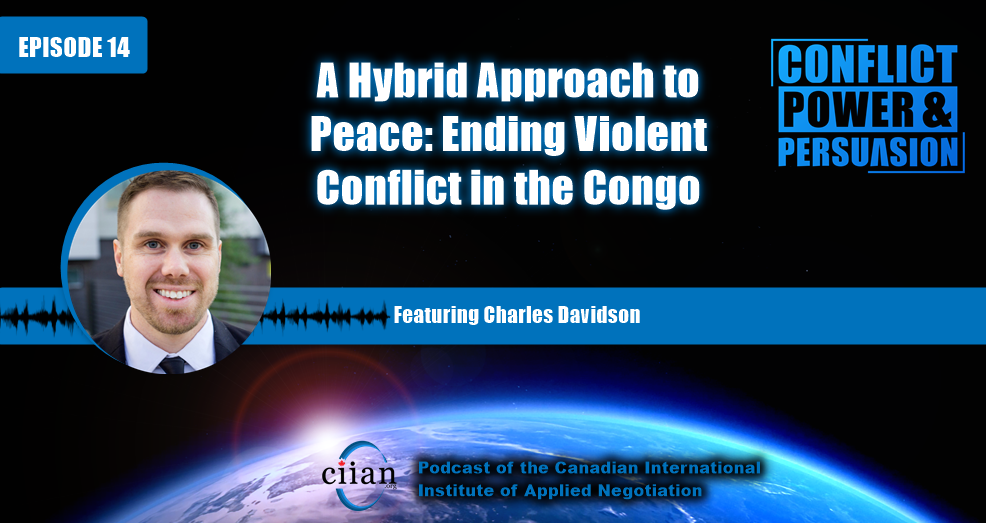
Links:
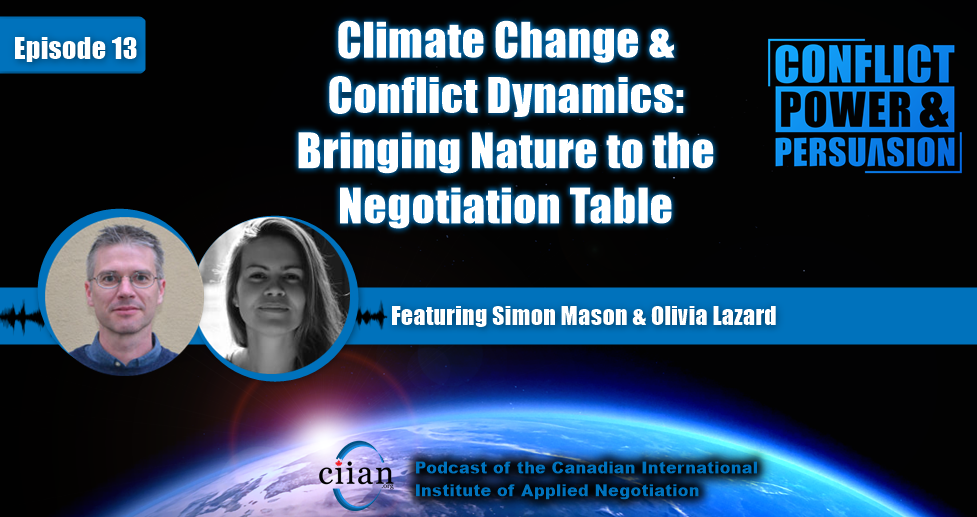
Simon J. A. Mason is a senior researcher and head of the Mediation Support Team at the Center for Security Studies (CSS), ETH Zurich. He has been involved as a facilitator in workshops on conflict analysis, dialogue, negotiation, and mediation with actors from conflict contexts around the world. Together with Dekha Ibrahim Abdi, he recently co-authored the book: Mediation and Governance in Fragile Contexts: Small Steps to Peace.
Olivia Lazard is an environmental peacemaking and mediation practitioner as well as a researcher. She is currently a visiting scholar at Carnegie Europe where her research focuses on the geopolitics of climate, the transition ushered by climate change, and the risks of conflict and fragility associated to climate change and environmental collapse.
In this episode of Conflict, Power, & Persuasion, we’ll take an in-depth look at environmental disputes with special consideration of the impact of climate change, including discussions about why and how nature could be brought into peace negotiations.
Some topics discussed include:
- The four pathways between climate change and conflict.
- Conflict economies
- Ecological interdependencies including deforestation and the hydrological system.
- Global priority regeneration areas and decarbonization commodities.
- The unique characteristics of environmental disputes.
- Considerations for mediators and process/content issues in environmental disputes.
- How to “bring nature to the table”.
- The use of experts and technological tools in environmental disputes.
- Mediator ethics and the importance of setting “red lines”.
- Examples of environmental regeneration.
And much more!
Links:
- Olivia Lazard Bio
- Simon Mason Bio
- Mediation and Governance in Fragile Contexts: Small Steps to Peace. By Dekha Ibrahim Abdi and Simon J. A. Mason
- Paper on Global priority areas for ecosystem regeneration
- SIPRI Policy Brief on four interrelated pathways between climate change and conflict
- Youtube video on regeneration of China’s Loess Plateau
- Mediating Water Use Conflicts in Peace Processes by Simon Mason and Dorothea Blank
- The EU and Climate Security: Toward Ecological Diplomacy by Olivia Lazard and Richard Youngs
- A conversation with François Gemenne, one of the lead authors of the IPCC report, and Olivia Lazard
- The power of soil: How our precarious climate shaped the Arab Spring, by Olivia Lazard
- Sustainable Peace & Security in a Changing Climate: Recommendations for NATO 2030
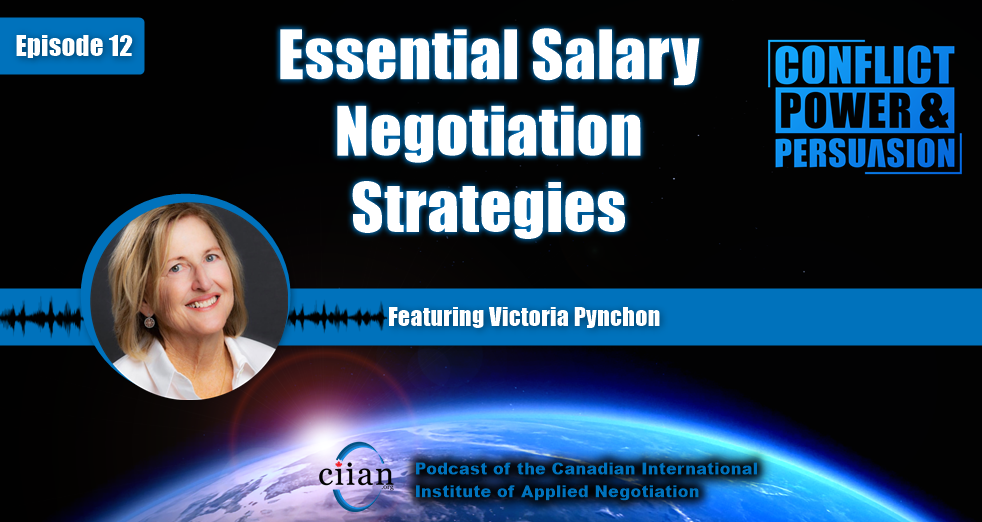
- The common mindset when requesting an increase in compensation.
- How to find your market value (and why it’s important to do so).
- The step-by-step process of negotiating a raise or starting salary.
- Negotiation strategies including anchoring, discovering interests, mimicry and more.
- How to deconstruct compensation to create value.
- Imposture syndrome
- Subjective versus objective standards
- Tips for coaches
- Victoria’s favorite negotiation resources
- Jamie Lee: https://www.jamieleecoach.com
- Stephanie Health: https://www.soulworkandselfies.com/
- Rachel Rogers: https://helloseven.co/
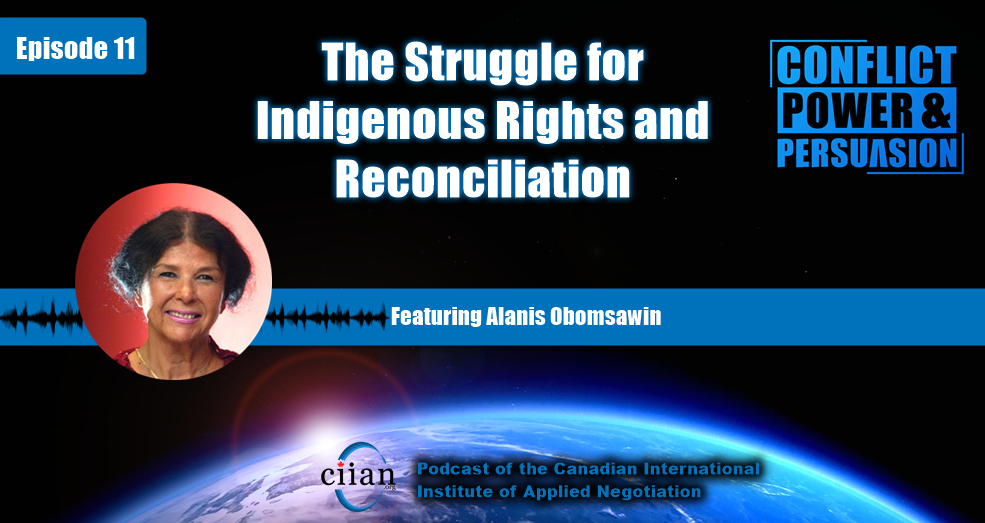
Alanis Obomsawin was born in 1932 and is a member of the Abenaki Nation. She spent her early years on the Odanak reserve, then at the age of six relocated to Trois Rivieres, Quebec, where her family was the only Indigenous people in the community. Driven by the need for truthful and respectful education about Indigenous peoples, while in her early 20s, Alanis began performing as a singer and storyteller and toured in Canada, the US and Europe including managing her own stage at the Mariposa Folk Festival in the 1960s.
In the late 1960s Alanis was hired as a consultant by the National Film Board of Canada where she went on to become one of the most acclaimed Indigenous directors in the world, completing dozens of documentaries, exploring the lives and concerns of Indigenous peoples including violent conflicts such as the raids on the Mi’kmaq over fishing rights in the early 1980s and the historic Mohawk standoff at Oka.
Alanis has an incredible list of well-deserved awards and honors including honorary doctorates from the universities of York, Carleton, UBC, Western, McGill, Concordia, and Dalhousie. In 1983 she was made a Member of the Order of Canada, she’s received the Governor General’s Performing Arts award for Lifetime Artistic Achievement, the Glenn Gould Prize, the prix Albert-Tessier for contribution to Quebecois cinema, and many others.
In this episode of Conflict, Power, & Persuasion we take a walk through time, discussing the struggles to realize Indigenous rights and the path to reconciliation.
Some topics discussed include:
- What it was like when Indigenous people were granted Canadian citizenship.
- The core values needed to connect with others.
- Alanis’s experience of being on the ground during the Oka Crisis.
- Leadership
- The importance of connecting with elders and understanding your history.
- Reconciliation: Healing, Apologies and Forgiveness
- Nelson Mandela
- Senator Murray Sinclair
- Storytelling through music
And much more!
Links:
CBC’s Telescope Episode: https://www.cbc.ca/archives/entry/alanis-obomsawin-the-activist
Bush Lady Album: https://alanisobomsawin.bandcamp.com/
NFA Documentary Films: https://www.nfb.ca/directors/alanis-obomsawin/
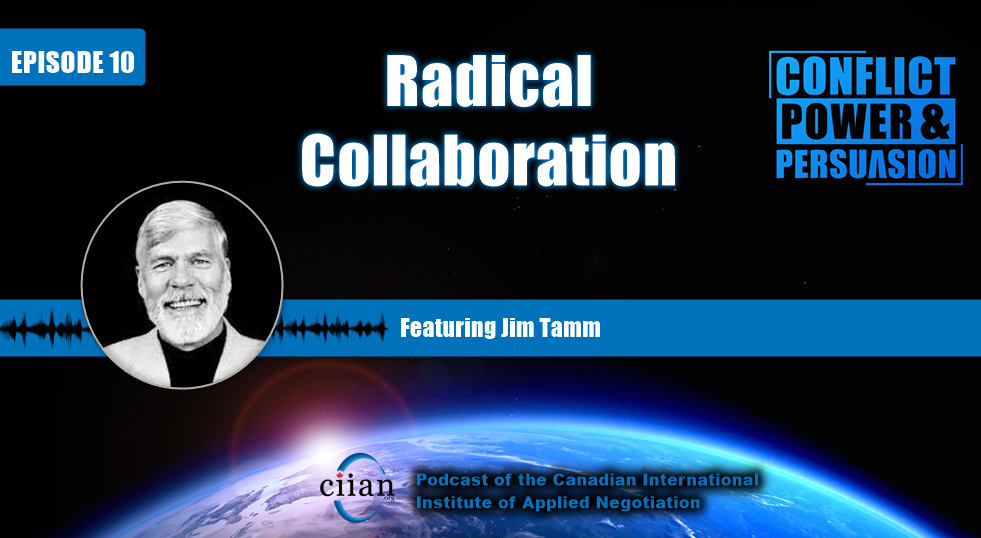
Jim Tamm is a former judge and an expert in building collaborative workplace environments, with 40 years of experience in the field of alliance building and conflict resolution. As a Senior Administrative Law Judge for the State of California for 25 years, Jim mediated more than 1,000 employment disputes.
His legal decisions have impacted national labor policy in the US, and he has authored training materials that have been published in fourteen languages. The California Senate, the California Assembly and the California Public Employment Relations Board have all honored Jim for his work building more collaborative employment environments.
His most recent book, Radical Collaboration (co-authored with Ron Luyet) was on Amazon’s top seller lists for workplace, organizational psychology, collaboration and negotiations books for most of the past nine years. He is a former law professor and is currently on the faculty of the International Management Program of the Stockholm School of Economics, the Management Education Program at NASA, and the Leadership Academy of the University of California, Santa Cruz, and the Wallenberg Institute in Sweden.
Jim has a diverse client base of international organizations ranging from the United Nations, NASA, Toyota and Boeing, the US Army and Navy, to universities, financial institutions, pharmaceuticals and toy companies.
Some topics discussed include:
- The Super Chicken Model
- The results from the pilot study that lead to Jim writing Radical Collaboration
- The five skills needed to achieve collaboration.
- The power of paying attention to your attitude.
- The importance of Will Schutz’s research on openness and creating psychological safety.
- Why Jim thinks working on defensiveness is the most important factor that can influence the collaboration process.
- The three biggest fears that can lead to defensiveness.
- Why conflict avoidance is the dominant style in workplaces.
- The common behaviours and characteristics of “red zone” cultures.
- The importance for mediators to set boundaries.
And much more!
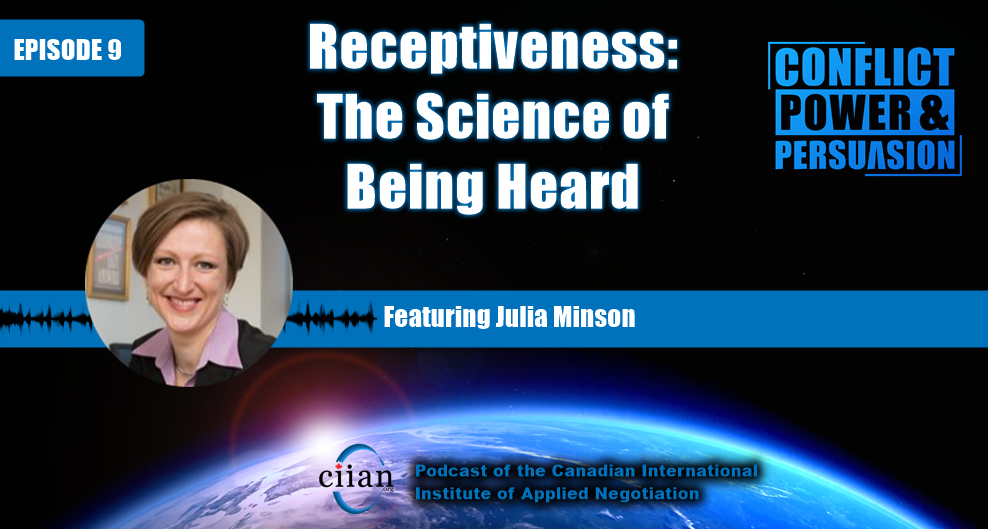
- What receptiveness is and why it’s so important.
- Whether liberals are more receptive than conservatives.
- Whether men or women are more receptive.
- How age influences our openness to the opinions of others.
- The link between receptiveness and good decision-making.
- The linguistic markers that convey receptiveness.
- The power of acknowledgment.
- How mediators can frame discussions to promote receptiveness.
- Why being formal and polite in an argument can be counterproductive.
- The key to creating receptiveness at Braver Angels workshops.
- How you can test your own level of receptiveness.
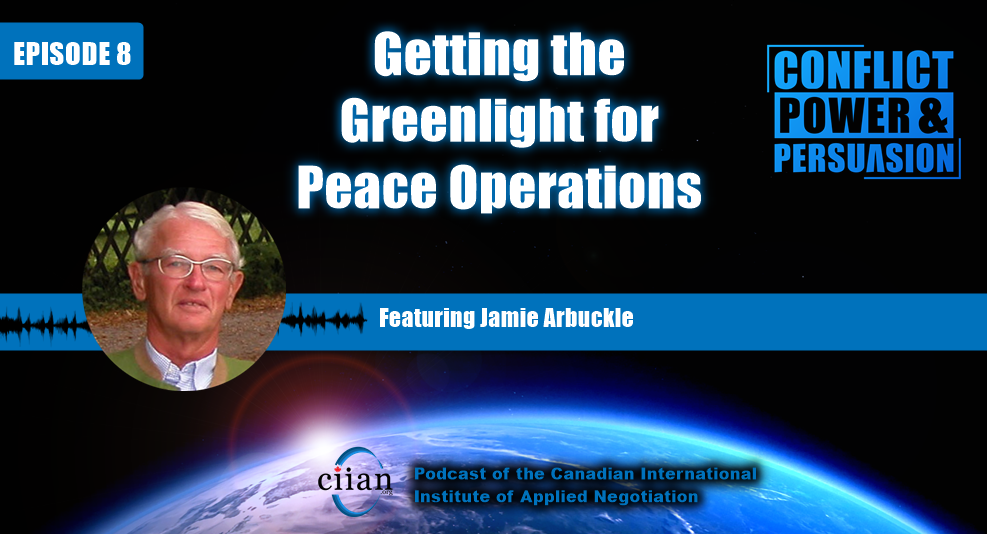
- The first modern peacekeeping mission in the Suez crisis.
- The five layers of consent required for a successful peacekeeping mission.
- The trade-off between protecting human rights and sovereignty.
- How the UN induced consent in eastern Solvenia.
- The likelihood of launching a non-consensual peace operation.
- The Responsibility to Protect doctrine.
- Strategies to create host-government consent for peace operations.
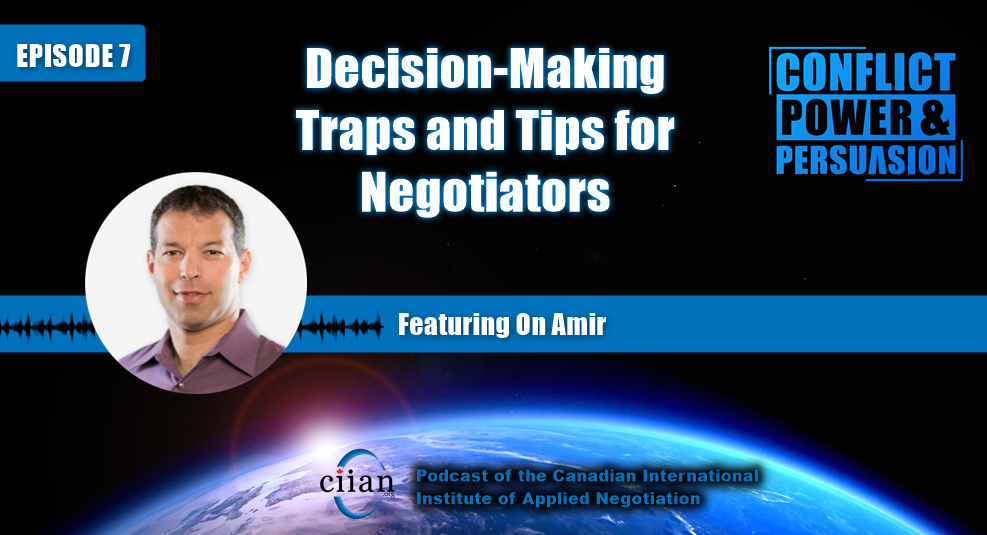
On Amir received his Ph.D in management science and marketing from MIT’s Sloan School of management and is a professor of marketing at UC San Diego. On’s research focuses on using psychological and economic principles to identify successful strategies in different market settings. He investigates different customer decision-making mechanisms and their influences on pricing and promotion strategies, on decision making under risk and uncertainty, and on preference dynamics. He also writes about how insights from research on decision making and behavioral economics may be used to improve business practices and policy making.
On has been retained as an expert witness and testified at deposition in numerous cases. He has also consulted to and conducted market research for companies in the life sciences, biotechnology, media, gaming, and defense industries. On has received several research awards from the Marketing Science Institute and from the Robert Woods Johnson Foundation.
Some topics discussed include:
- Homo Economicus
- System 1 and System 2 thinking
- Prospect Theory
- The best way to motivate a group to reach an agreement.
- The “starting problem” and “goal gradients”.
- How Robert Cialdini’s mother motivated him to get better grades.
- The effects of resource depletion on decision making.
- Cognitive biases including the attraction and compromise effects.
- Anchoring, opening offers, and using reference points in negotiations.
- How to limit cognitive biases and make better decisions.
- The ethics and applications of “choice architecture”
And much more!
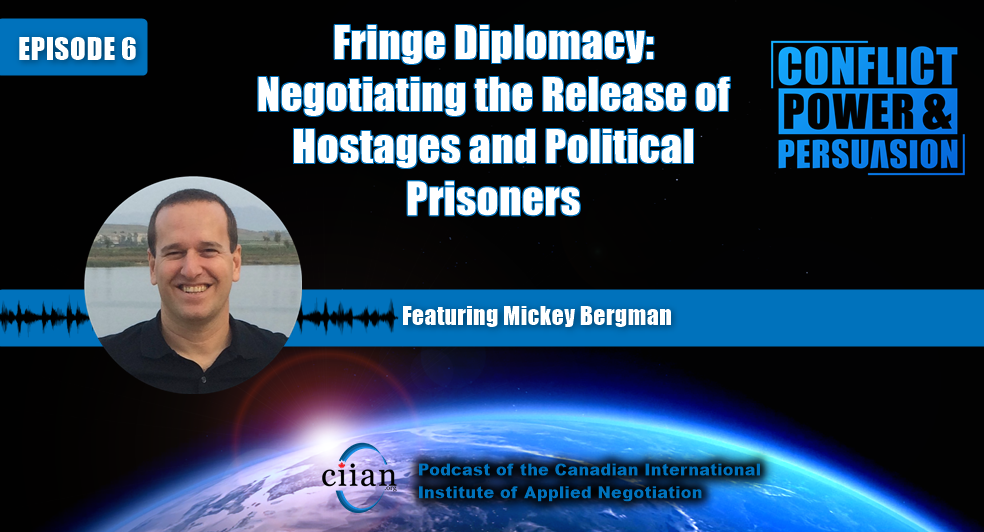
Mickey has spent over 15 years in various aspects of strategic diplomacy, and coined the term Fringe Diplomacy to describe the new field he is forging, an innovative discipline exploring the space in international relations just beyond the boundaries of States and Governments’ capacity and authority.
He manages relationships and private diplomacy efforts in North Korea, Cuba, Myanmar, Middle East, Venezuela and Africa. Nominated for the 2019 Nobel Peace Prize, alongside Former Governor Bill Richardson; Mickey has led his team at the Richardson Center to facilitate the release of more political prisoners than any other organization. Mickey creates new political capital by leading Professional Exchange Programs to frontier countries such as North Korea, Myanmar, Cuba, Lebanon, and others.
Mickey is Vice President and Senior Advisor at Governor Richardson Center for Global Engagement; was Executive Director of the Global Alliances Program at the Aspen Institute; is a professor at Georgetown University School of Foreign Service, where he teaches about emotional intelligence in international relations, and was consultant to the Clinton Global Initiative.
Mickey has published numerous articles, interviews, and opinion pieces in the New York Times, Washington Post, International Herald Tribune, Boston Globe, Foreign Policy Online, and Huffington Post. Mickey also has been featured as a subject matter expert for television interviews on CNN, ABC, CBS, Fox News, I24news, Global News, and ABC News Australia.
Some topics discussed include:
- The difference between political prisoners and hostages
- Robert Levinson, the longest held American hostage in history, and the newly created Hostage Recovery Act.
- The implications of the US’s “no-concession” policy on hostage-taking
- The detainment and negotiation efforts for the release of Otto Warmbier in North Korea
- How Mickey coined the term Fringe Diplomacy
- The role of Emotional Intelligence in international relations
- Why you don’t want to try to negotiate like Donald Trump or Chris Voss
- The negotiations for the release of American journalist Danny Fenster from Mynamar
- How the US could improve negotiations with North Korea
- How to address power differentials
And much more!
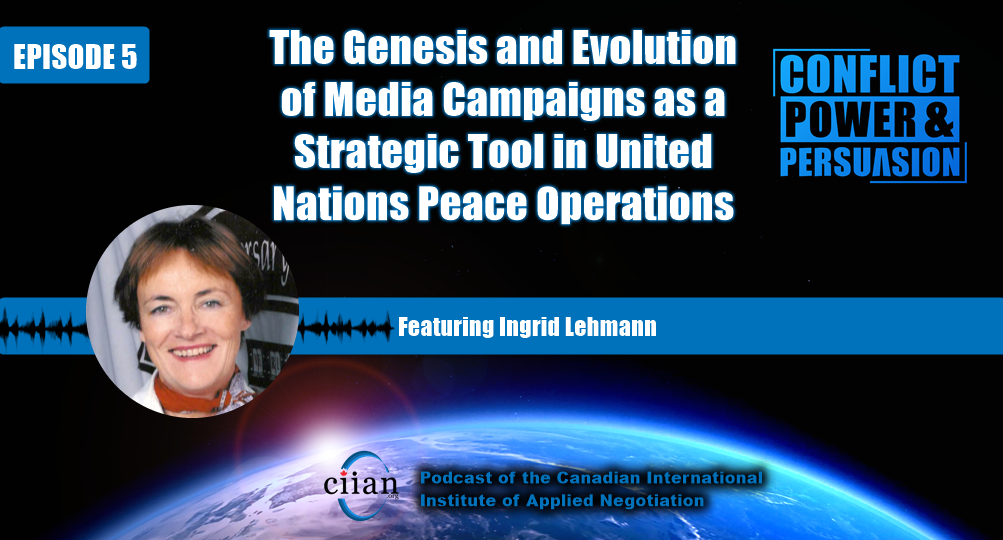
Ingrid spent over 25 years working at the United Nations Secretariat in the Department of Public Information and in two UN peacekeeping missions. Ingrid has an MA in history from the University of Minnesota and an MA and a doctorate in political science from the University of Berlin. She was a fellow at the Center for International Affairs at Harvard University, a researcher at Yale University’s UN Studies Program; and a fellow at Harvard University’s Shorenstein Center on the Press, Politics, and Public Policy. She’s the author of “Peacekeeping and Public Information – Caught in the Crossfire “ and “Managing Public Information in a Mediation Process (Washington, 2009) and has published numerous articles about international political scandals, the role of media in international negotiations and peace communication.
Some topics discussed include:
- The genesis and evolution of media campaigns as a tool in UN peace operations
- The Brahimi Report
- General Romeo Dallaire, radio jamming and the Rwandian genocide
- How media can ultimately affect policy
- The essential first steps for launching a media campaign on foreign soil
- Major challenges in media campaigns
- Addressing rumours
- Gaining trust
And much more!
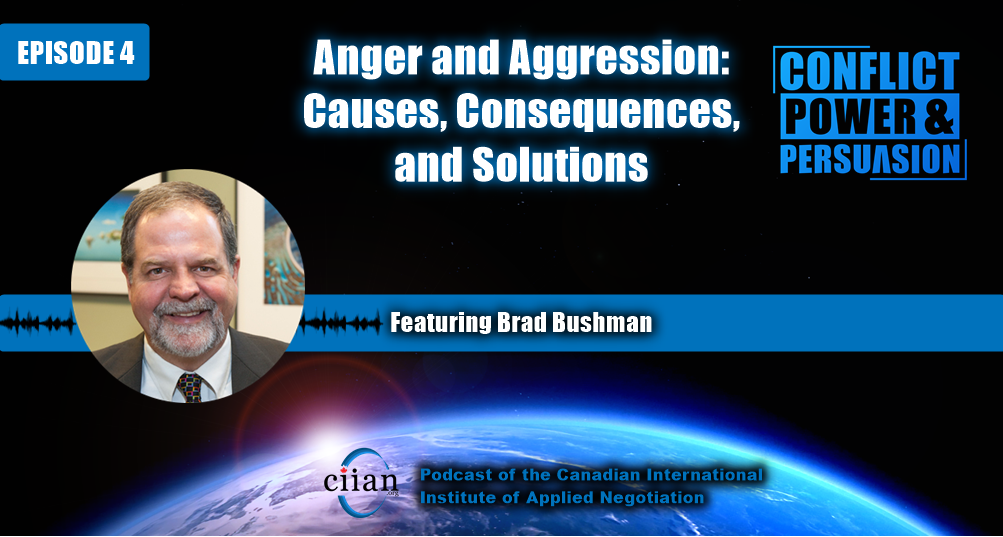
Brad is a Professor of Communication, at Ohio state university. He studies the causes, consequences, and solutions to the problem of human aggression and violence. He was a member of President Obama’s committee on gun violence, and has testified before the U.S. Congress on the topic of youth violence. His research has challenged several myths (e.g., violent media have a trivial effect on aggression, venting anger reduces aggression, violent people suffer from low self-esteem, violence and sex sell products, warning labels reduce audience size). He has published over 200 peer-reviewed journal articles, which have been cited over 35,000 times. His research has been published in the top scientific journals (e.g., Science, PNAS), and has been featured extensively in the mass media (e.g., BBC, New York Times, NPR). In 2017, he received the Kurt Lewin Award from the Society for the Psychological Study of Social Issues for “outstanding contributions to the development and integration of psychological research and social action” (jointly with Craig Anderson).
Some topics discussed include:
- Three routes that lead to aggressive behaviour.
- The critical link between self-control and aggression.
- Self-control as a predictor of success.
- Exposure to violent media and the psychological impact of living in war zones.
- Inclusivity, discrimination and the effects of social rejection on individuals.
- The relationship between self-confidence and narcissism on aggressive behaviour.
- Practical research-backed tips for anger management and maintaining control in heated exchanges.
And much more!
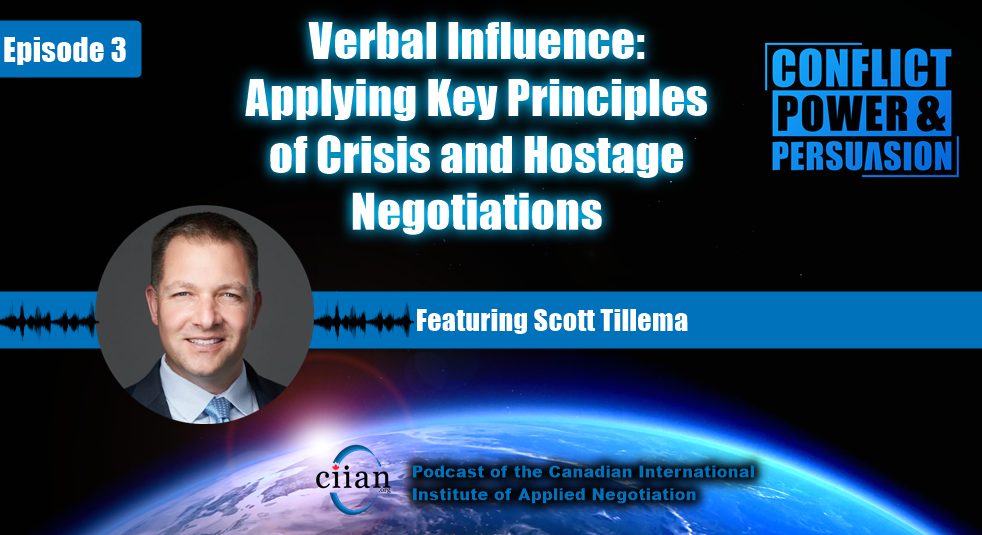
Scott is a nationally recognized leader in the field of crisis and hostage negotiations, passionately training thousands of police negotiators across the country in verbal influence. He has developed a powerful model for safely resolving crisis situations, which is now being recognized and adapted by the private sector for use in sales, communication, influence, and leadership.
Some topics discussed include:
- The FBI’s staircase model
- Role of emotion in negotiation – and how to address them
- Active listening
- The need for creating autonomy as a negotiation strategy
- The importance of gaining experience through scenario based training
- The best way to create the ability to influence.
- The power dynamics within hostage and crisis negotiations
- Lying and Negotiation Ethics
- The overlap between hostage and business negotiations
And much more!
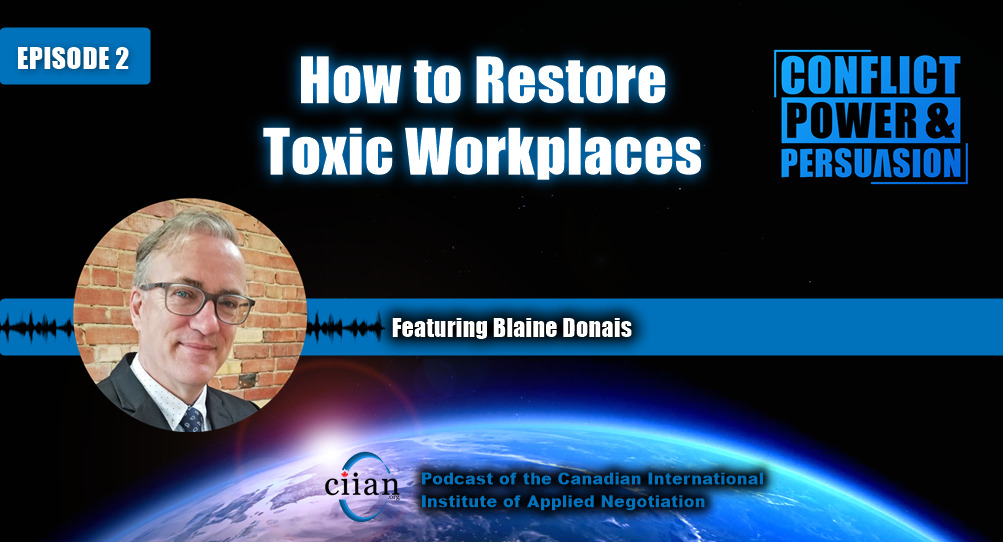
Blaine is a labour lawyer and member of the Law Society of Upper Canada since 1995, and is an expert in both the practice and theory of assisted labour/management negotiation, mediation-arbitration and facilitation. He has the Chartered Mediator (C.MED.) designation from the ADR Institute of Canada, and is a Registered Practitioner of Dispute Resolution (RPDR) through the Canadian International Institute of Applied Negotiations (CIIAN).Blaine trains Human Resources professionals, Labour leaders and others in Human Rights, Labour and Employment law, Human Resources, Collective Bargaining and Conflict Resolution. He is presently Adjunct Professor of Workplace Dispute Resolution at Atkinson College, York University, Toronto, and Adjunct Professor for the Centre for Industrial Relations and Human Resources at the University of Toronto.
In this episode, Blaine unpacks workplace conflict and walks us through his restoration process to transform toxic workplace cultures. Topics discussed include:
- symptoms and causes of toxic work environments
- the cost of unresolved conflict in the workplace
- the major reason professionals leave their positions
- how to identify conflict in the workplace
- the process and challenges of workplace restoration
- how conflict training is a core competency of leadership
- how trust is at the core of the workplace restoration process
- the use of coaching as a tool within workplace restoration
- what managers and business owners can do to assess and prevent conflict in the workplace
- what employees can do if they find themselves in toxic environments
And much more!
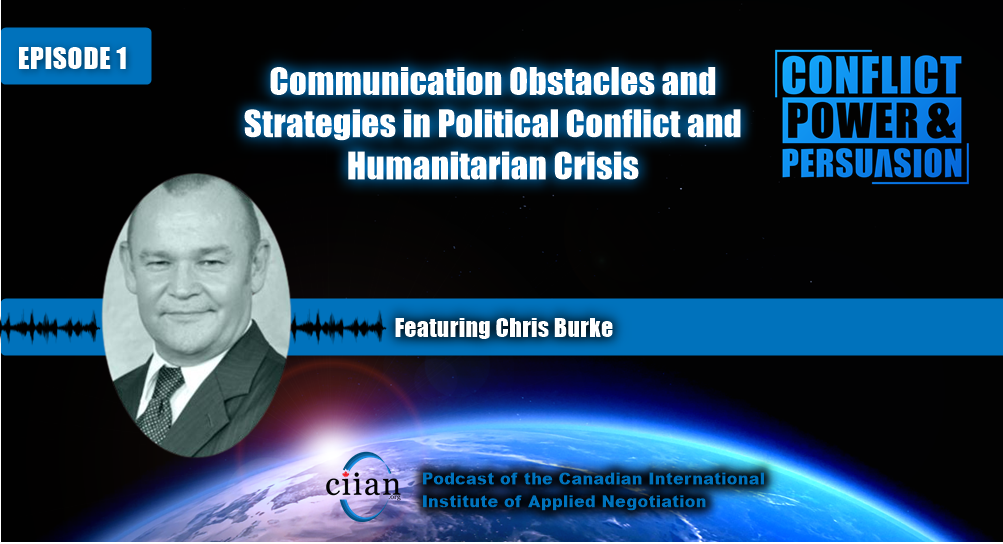
Chris has an incredibly diverse background and is a communications expert, with extensive experience in conflict situations. Chris is an Australian, and after a broad range of international projects, settled in Kampala, Uganda, where he has made his home for over 20 years, and is a sought after on-the-ground professional to execute and consult on major projects for organizations including: CARE,US-AID, the World Food Program, the WWF, UNICEF and the Carter Center, to name a few. He played an instrumental role in the implementation of the Nairobi Peace Agreement and is sought after for his experience with land related conflicts – including land tenure and socially responsible and compliant agro-forestry practices. Chris has spearheaded many sensitization campaigns; was involved in UN Peace Keeping Operations in South Sudan; he even initiated and directed the undertaking of establishing the first commercial FM radio station in Juba.
Some topics discussed include:
- impacts of culture on communicating
- creating trust for effective communication
- the impact of communication technologies on violent conflict
- strategies to address infodemics
- sensitization campaigns
- general tips for foreign aid workers and traveling abroad
And much more!



